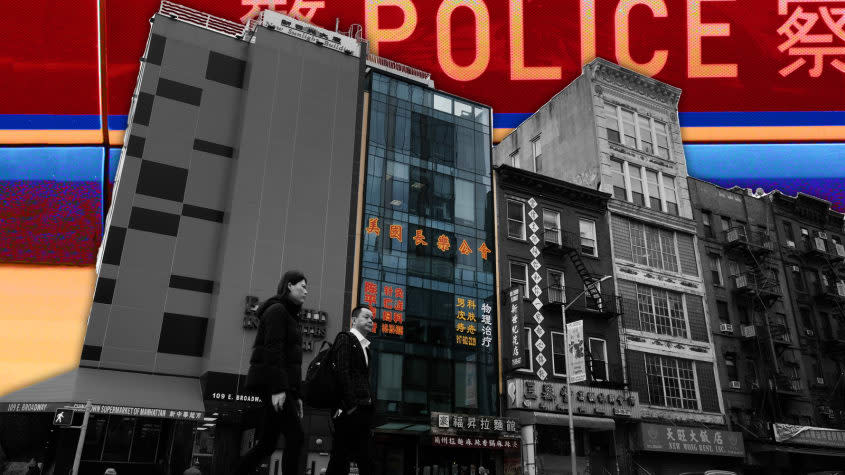Hidden in plain sight: The hunt for China's 'secret police offices'

Federal officials arrested two men in New York City for allegedly operating a Chinese "overseas police station" in Manhattan, which officials claim was used to harass Chinese dissidents. How common are these alleged "police stations," and why does China seem so intent on using them?
What are China's alleged 'overseas police stations?'
They are reportedly "secret police offices" that are run by Chinese nationals in countries around the world, The Associated Press reports, often in locations "where Chinese communities include critics of the Communist Party who have family or business contacts in China." While these sites are typically set up under the guise of providing diplomatic services, there have been accusations that many operatives within these outposts "harass or threaten both citizens and non-citizens" that criticize China, AP adds.
However, if these allegations are to be believed, then the harassment may also go beyond mere threats. A report from human rights group Safeguard Defenders claims that the stations often use intimidating tactics to try and repatriate ex-Chinese nationals who they accuse of criticizing the country, using "illicit methods to harass, threaten, intimidate, and force targets to return to China for persecution."
There are some circumstances where the alleged police stations may be hidden in plain sight. One alleged location in the U.K. was in "an estate agent's office on a busy street in Hendon, a north-western suburb of London," The Economist reports, adding that it was a "small, plain space — typical of high-street property firms."
Where are these stations, and how many are there?
According to various reports, these stations are all over — and there are tons of them.
Safeguard Defenders listed suspected more than 100 locations across nearly the entire world. A map created by the organization showed that the locales spanned six continents, with suspected outposts in the U.S., Canada, Russia, Australia, and most of Europe and South America.
A list compiled by Newsweek found alleged Chinese police stations in more than 50 countries. This includes at least three in Brazil, five in Canada, four in France, 11 in Italy, nine in Spain, three in the U.K., and four in the U.S., among dozens of others. Many of the newer sites in Eastern Europe, such as Croatia, Serbia, and Romania, are part of "a wider expansion of Chinese overseas stations" than was previously thought, CNN reports.
What has China said about these sites?
China, unsurprisingly, has consistently denied that these locations are used as secret police stations. When Safeguard Defender's report was released, an official from the Chinese Foreign Ministry told CNN they hope "relevant parties stop hyping it up to create tensions. Using this as a pretext to smear China is unacceptable." The country has claimed that these sites are used for a variety of purposes, CNN notes, including as a place for Chinese nationals to renew their IDs. The Foreign Ministry also said that the locations were partially a response to the COVID-19 pandemic.
After the Manhattan arrests, China doubled down on its dismissal of wrongdoing, with the Foreign Ministry saying the accusations "have no factual basis, and there is no such thing as an overseas police station."
While CNN adds that "undeclared consular activities outside of a nation's official diplomatic missions are highly unusual and illegal," China has asserted that nothing of the sort is happening, despite evidence to the contrary from Safeguard Defender. However, in some countries, such as the Netherlands, Dutch officials said that the existence of the centers was "illegal to begin with" because China had not informed the Netherlands about them, per The Economist.
What can be done about them?
The men arrested in Manhattan had allegedly "established a secret physical presence in New York City to monitor and intimidate dissidents and those critical of its government," the U.S. Justice Department said in a statement. Of course, arresting everyone who works in these alleged sites, all across the world, is simply impossible.
Despite this, federal organizations and international groups are reportedly looking into ways to try and dampen the commonality of these outposts. FBI Director Chris Wray said in 2022 that the agency was "aware of the existence of these stations," per BBC News, adding it was "outrageous to think that the Chinese police would attempt to set up shop ... it violates sovereignty and circumvents standard judicial and law enforcement cooperation processes." Wray said the FBI was looking into the legal parameters to try and shut these sites down.
The British parliament also said that any attempt to unlawfully repatriate a citizen back to China "will not be tolerated," calling the secret police stations "part of a wider trend of authoritarian governments perpetrating transnational repression in an effort to silence their critics overseas." Even as countries look to the law books for ways to try and stop these stations, the recent Manhattan arrests prove they are likely still thriving, and more common than the average person may realize.
You may also like
Trump, other GOP rivals mock DeSantis for getting 'absolutely destroyed' in Disney feud
Dominion CEO says 'we feel we got' accountability in Fox settlement

